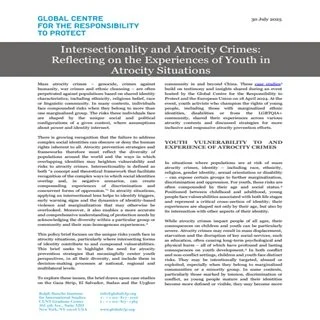By The Global Centre for the Responsibility to Protect
Mass atrocity crimes are often perpetrated against populations based on shared identity characteristics, such as ethnicity, religion, race or language. In many contexts, individuals who belong to more than one marginalized group face heightened and compounded risks. These risks are shaped by the unique social and political dynamics of a given context, where assumptions about power and identity intersect.
There is growing recognition that failing to address complex and overlapping identities can obscure or deny the human rights inherent to all. Effective atrocity prevention must reflect the diversity of populations around the world and recognize how intersecting identities contribute to vulnerability and risk. Applying an intersectional lens is essential to identifying early warning signs, understanding the drivers of identity-based violence and ensuring no one is overlooked.
This new policy brief focuses on the specific risks faced by youth in atrocity situations, particularly when multiple forms of identity compound their vulnerability. This brief underscores the urgent need to meaningfully center youth perspectives, in all their diversity, within national, regional and multilateral atrocity prevention strategies and decision-making processes.
The brief draws on case studies from the Gaza Strip, El Salvador, Sudan and the Uyghur community in and beyond China. These examples are informed by testimony and insights shared by youth activists during an event hosted by the Global Centre for the Responsibility to Protect and the European Union on 18 April 2024. Participants included young advocates for marginalized ethnic groups, people with disabilities and LGBTQIA+ youth, who shared their lived experiences and strategies for more inclusive, effective prevention.
New York: Global Centre for the Responsibility to Protect 2025. 7p.



